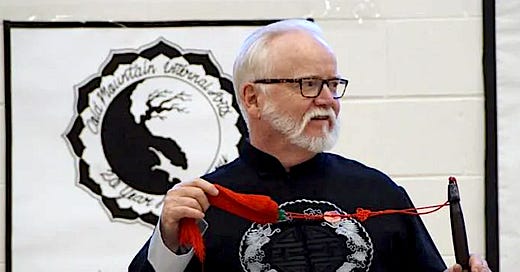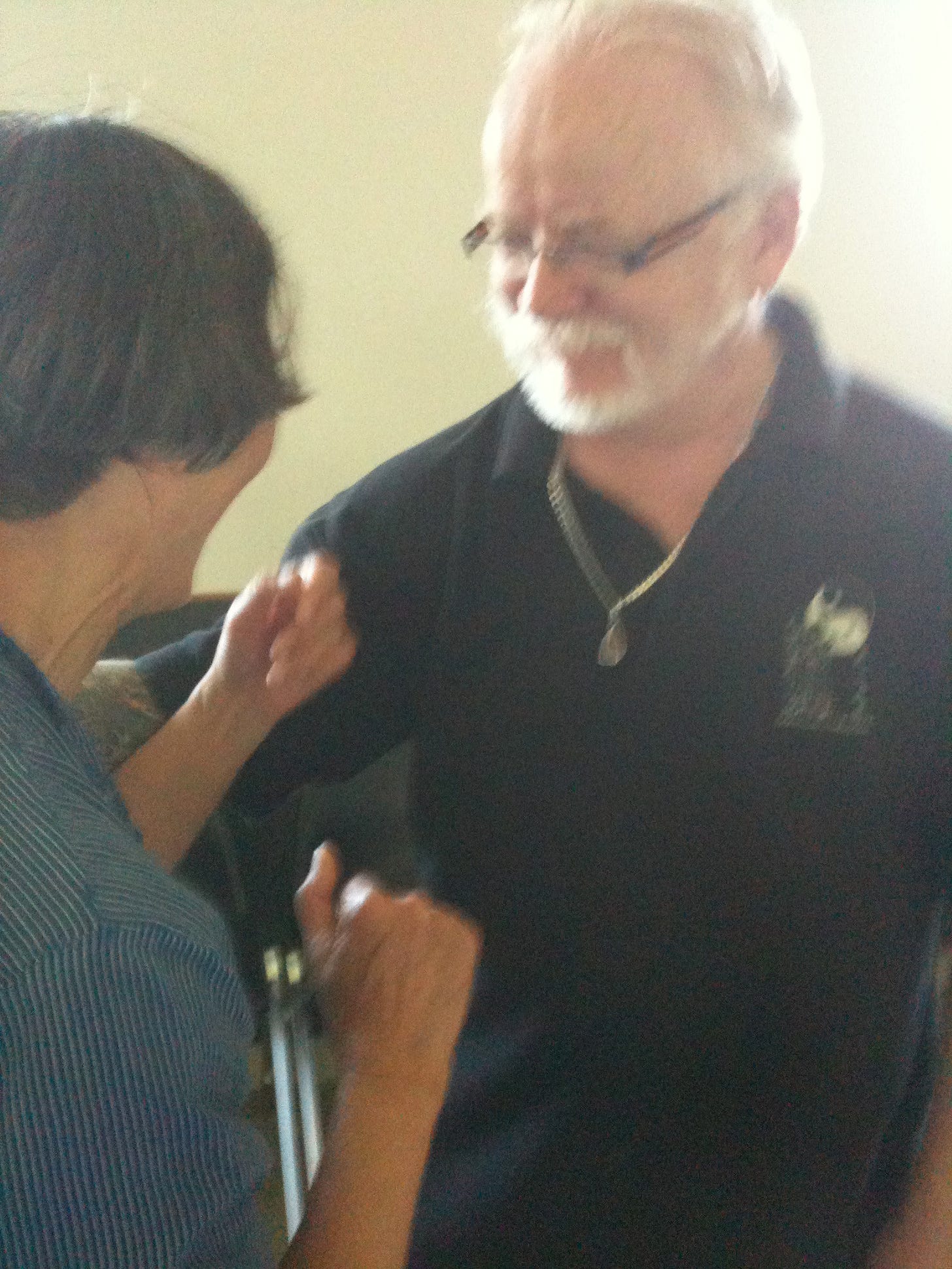Steve Higgins was passionate and curious. When his thoughts turned to a particular subject, he bit into it like a bulldog, pulling it, shaking it, and holding on until it was truly his. His curiosity, which was expressed in many diverse ways, was infectious—and this drove his teaching. Born in 1950, Steve passed away in the early days of 2025. Shortly before his departure, his book “The Martial Essence of Tai Chi” was released.
It was a great privilege to count Steve among my friends and students in the world of taijiquan and he was, for decades, a great supporter of my work.
Steve established his club ‘Cold Mountain Internal Arts’ in 1990 in Kitchener, Ontario in Canada. 'Cold Mountain' (Hanshan 寒山), refers to a Chinese monk and poet from the Tang dynasty who is known for some 300 poems of quiescence and contemplation.
“People ask the way to Cold Mountain. Cold Mountain—there's no trail.”
Steve was dedicated to the study of all aspects of taijiquan—martial, physical, meditative, and spiritual. He sought out wisdom from many sources and shared his understanding in community centres, libraries, and parks.
Steve Higgins and I enjoyed a wonderful correspondence by email that touched on various subjects. Here are some excerpts of Steve’s thoughts from our dialogues that, I believe, paint a clear picture of his guileless character and supreme enthusiasm for the art:
“The development of jie / intercepting jin out of chang ‘long’ jin makes perfect sense. Done sweetly, one can knock the other guy right out of his socks. (Loong Wong says that the only reason my Tai Chi is any good is that I started out as a hard-stylist!)”
“I was looking at the taxonomy of 24-25 Jins that is in Chen Yan-lin. Is he the actual source? Jie Jin turns up twice in the taxonomy: Once as Borrowing and once as Intercepting. Is this correct? Or are they two different characters?”
“Did you know that in its early days the Royal Society was known as "The Invisible College"? I think, as you observe, that this is how we should perhaps view his legacy. It is diffuse, and yet powerful!” (Regarding Jou Tsung Hwa)
“Since March of 2022 I've taught Chen-style, Old Yang (middle frame), Tai Chi Fan, and Yang style by ZOOM. About 4 months ago I also restarted in-person lessons in the church on Monday evenings. The club has changed, somewhat, largely due to the pandemic.”
Grandmaster Yang responded to my my intentness very generously. He introduced me to GM Yang Jun as "a very serious student" and said in a formal written evaluation that my Yang style form was "approaching the final goal". I took this great compliment and also an affirmation of the integrity of the transmission I have had from my teacher, friend, and colleague, Sam Masich.
I had an opportunity at one point to push hands with the Grand-master. He felt...round. He felt firm, deflective, centered... just right. Not subtle or tricky.
“I think the Chens had a connection to Yuan Xi-kai.”
Just a thought --- Have you considered a workshop on the Yang Style throwing elements? In my seventies I have no intention of being thrown around. (Nor does our friend Ed!) Still, this is such an essential part of the Yang style that everyone seems to ignore....
I greatly enjoyed your series on the families. I need to go back to the beginning and go through it again. Gotta a few questions. I hope you can help!
“Major thing at this end is that I'm now post-op for bowel cancer and am expecting to start chemo before too long. A drag - sure - but also a challenge. This has also afforded me time to drill down more into the 108 and to reflect gratefully upon the excellence of my students who have kept the club going (and the excellence of my teachers, including yours truly!).
I have a few other stories from this episode, like when with Jack Yan and Ed Cooper we regaled at midnight a bunch of Tai Chi grand-masters with an alcohol-fueled rendition of "Unchained Melody" (they were assaulting us with Chinese opera) but, as Shakespeare said, "The rest is silence."
As a student Steve directed my attention to several subjects that I hadn’t yet explored and he asked the kind of questions that kept me on my toes. His presence in my taijiquan classes was felt by everyone as his boundless enthusiasm propelled investigation, exploration, and challenged limits of understanding.
As a teacher Steve was beloved by his many students. He was able to challenge and even provoke everyone to take larger steps along their path all-the-while with humour and patience.
“His kindness, patience, and wit, his curiosity and passionate approach to tai chi, were his hallmarks.” —Linda Kearnes (studied with Steve for 35 years)
“Steve had a very gentle way of teaching, accommodating all levels of ability. He gave new meaning to the term martial arts; it was more peace-filled arts.” —Former student Anne Cameron
From Steve’s obituary:
For those who knew Steve and would like to honour his memory; read a good book, raise a glass of whiskey, listen to some jazz, and hug your loved ones. That's all that really matters.








I became a student of Steve Higgins in the mid 90's after many years of training in Kempo, Karate and Jiu Jitsu. I first joined his club due to knee injuries which I thought Tai Chi would benefit owing to the gentler movements and emphasis on physical alignment and "rootedness". Steve's class usually began with Qi Gong in it's many forms before moving to Tai Chi. Subsequently, I have practiced Chi Gong regularly since then and have found it to be a great benefit to my physical and mental health. I am saddened to learn of Steve's passing and greatly appreciate the knowledge in the internal arts he shared with me. I count him as one of the two most influential martial arts instructors in my journey. I sincerely hope that some of his many students will carry on his legacy.
How do I get a copy of his book?